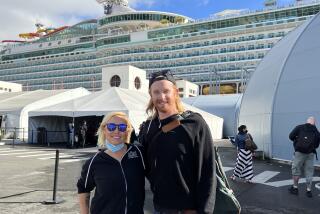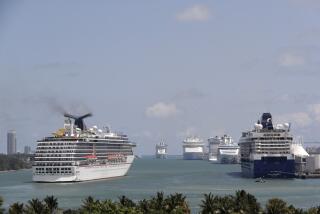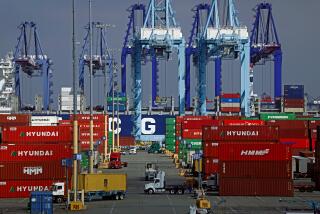With Ebola scare, travel industry hits rough patch
- Share via
With a series of embarrassing accidents in its wake, the $37.1-billion cruise industry was looking forward to a strong booking season this winter. Instead, cruise operators are facing the same crisis that has shaken the airline industry: Ebola.
Mexican authorities Friday blocked a Carnival cruise ship from docking in Cozumel after the U.S. Centers for Disease Control and Prevention alerted Carnival Corp. that a passenger may have handled Ebola-contaminated lab specimens at the Texas hospital where a Liberian man died.
------------
FOR THE RECORD:
Ebola and travel industry: An article in the Oct. 18 Business section about Ebola’s effects on the travel industry said Princess Cruises screens passengers who have been to Liberia, Sierra Leone or Guinea within 21 days of departure. The article should have added that the cruise line, like Carnival, denies boarding if the screening determines that a passenger has been to those countries within the 21-day period. —
------------
The escalating Ebola scare has the travel industry scrambling to figure out how to reassure anxious Americans that it’s still safe to take a vacation.
Travel companies have already begun to take steps that crisis management experts say are needed to prevent the outbreak from quelling travel demand and spending.
“The best thing they need to do is to go on social media and on their websites to announce they are taking measures,” said Drew Kerr, a crisis management expert with Four Corners Communications. “The whole thing is about the future and making people feel good about what is ahead.”
Big money is at stake.
Shares of airlines, hotels and cruise ship companies have dropped over the last month — starting about the time that Thomas Eric Duncan traveled to Texas and tested positive for the deadly disease.
Shares of Miami-based Carnival, the world’s largest cruise company, have dropped 12.64% over the last month. Carnival shares closed up 23 cents, less than 1%, at $34.92 on Friday.
“Cruise lines and airlines are seen as potentially vulnerable to Ebola because of the ... proximity that people must be in on planes and ships,” said Matthew Jacob, a cruise analyst for ITG Investment Research.
Anxiety first hit the travel industry when news spread that a nurse who had treated Duncan flew on Frontier Airlines a day before testing positive for Ebola. The airline is trying to contact more than 1,000 passengers who either flew on the planes with the nurse or on subsequent flights.
Frontier said Friday that the news has not prompted mass cancellations, but the airline has received about 1,000 calls from customers with questions about the Ebola case.
Likewise, travel agents and online booking sites have not seen widespread cancellations. But travelers clearly are nervous.
“This disease and the potential for spreading it among travelers is being hugely underestimated,” said Laura Byrd, a freelance writer who recently flew to Dallas and San Antonio. “It’s unsettling.”
Off the eastern coast of Mexico, a Carnival ship carrying a laboratory supervisor from the Texas hospital has isolated her and a companion in a cabin, even though she has shown no symptoms. Still, Mexican authorities would not let the ship dock in Cozumel, forcing the cruise line to reroute the ship to Galveston, Texas.
To make up for the missed stop, Carnival said it has provided each passenger $200 in onboard credit and a 50% discount on a future cruise.
Over the last year, Carnival has improved its tarnished image, according to Kerr, especially after a series of accidents that started with the sinking of the Costa Concordia in 2012. The wreck killed 32 passengers and crew members. The ship was operated by a Carnival subsidiary.
In February 2013, a fire on the Carnival Triumph left the ship without power in the Gulf of Mexico, stranding passengers for four days.
In response to the accidents, Carnival announced $300 million in upgrades for all of its ships last year.
“They pulled it together and their perception came back quite a ways,” Kerr said.
In the last year, several gastrointestinal illnesses have struck passengers on ships operated by Carnival’s competitors, Princess Cruises and Royal Caribbean International.
Despite such problems, the world’s cruise industry is expected to carry a total of 21.6 million passengers in 2014, a 3% increase over 2013, according to Cruise Market Watch, an industry researcher.
To keep those passengers returning, Princess Cruises said Friday that it is screening anyone who has been to Sierra Leone, Guinea and Liberia in the previous 21 days and is denying boarding to people who have helped care for or had physical contact with someone with Ebola.
Carnival is going a step further by denying boarding to anyone who has visited Sierra Leone, Guinea and Liberia in the previous 21 days. Plus, all guests sailing on Carnival ships must answer a series of health screening questions before boarding.
Carnival had already rerouted cruise ships that were scheduled to stop in West African countries in November.
Princess Cruises said Friday that it plans to change the itinerary of two ships that were scheduled to stop in West African ports next spring.
“I certainly think we are going to have to reassure passengers that their health and safety is absolutely our highest priority,” Princess Cruises spokeswoman Julie Benson said.
More to Read
Inside the business of entertainment
The Wide Shot brings you news, analysis and insights on everything from streaming wars to production — and what it all means for the future.
You may occasionally receive promotional content from the Los Angeles Times.











